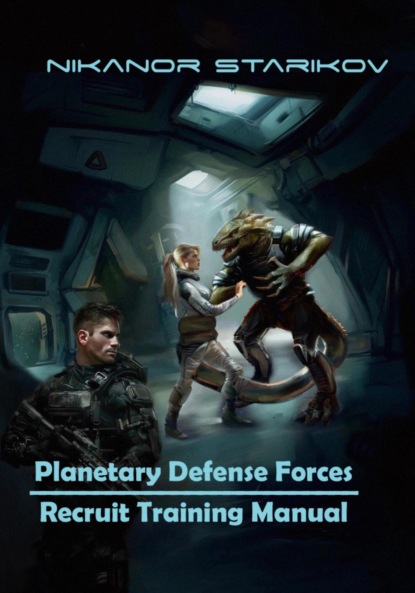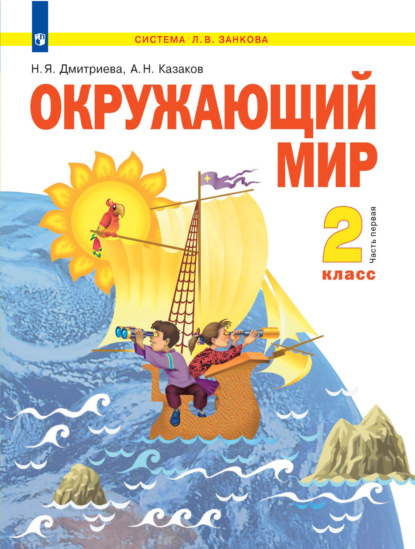Planetary Defense Forces. Recruit Training Manual

- -
- 100%
- +

Chapter 1
I was looking out the window from my office. Outside, huge, fluffy white snowdrifts were visible, and our department head's helicopter was landing on the helipad. Someone knocked very loudly on the door; it was my deputy.
"Comrade Major, permission to report."
"Report," I answered.
"General-Lieutenant Kalinin has arrived. He is gathering everyone in his conference room. You are ordered to attend the meeting," reported the young, lean captain. He had been working under me for three years now. A good guy, always disciplined and clean-shaven, not an ass-kisser, but not a schemer either. The latter was much more important to me.
"Yes, Captain, let's go. I'll just grab my tablet."
We walked down the large, dark corridor of our "firm." When I first arrived here, these corridors left an indelible impression on me.
It was 2004, and I was 17 years old. On a warm August morning, someone rang the doorbell to our apartment. Mom opened the door and saw two well-dressed men. One of them introduced himself as a state security officer. Mom let them into the apartment. They went to the kitchen, sat down, and asked her to call me. Honestly, I had no idea what was going on. Both guests looked similar, both dressed in black suits, white shirts, and black ties. They strongly resembled agents from a spy movie. I sat down on a chair in the kitchen, my whole demeanor showing I was very unhappy with their visit.
"Hello, I am Alexander Alexandrovich, a state security employee. Are you Starkov Pyotr Nikiforovich?"
"Yes, that's me."
"We have a few questions for you."
"Okay. I'm ready to answer them," I said, though honestly, my heart sank into my boots. I didn't understand why these men had come to our home, what they wanted from me. I was running through all possible scenarios and situations from the last few weeks.
"The thing is, Pyotr, we have received information that a group of young people in your area is periodically carrying out network attacks on state security servers. Over the past few weeks, they have taken our servers down eight times. Pyotr, tell me, do you know anything about this?"
After these words, I wanted to run out of the apartment. How did they know it was me and the guys who were taking down the servers of these internet "supermen" on order? I felt sorry for those soldiers of the invisible front: sitting every day behind old computers with a speed of 14800 bps… and we just wanted justice for them… My friends and I periodically took their servers down because it took about a week to restore one, and those who worked on it got two or three days off. That's how, one day, a young, but very myopic guy came to us with an order: to attack his server once a week. We agreed, as he paid well. When I asked why he needed so many days off, he said his father was ill and needed constant care now. We even felt awkward taking his money, but we took it and honestly fulfilled his order.
"Excuse me, Alexander Alexandrovich, honestly, I've heard something about this online, but I can't help you. All I've heard is that some guys are accessing a backdoor on 889:444 and messing with the sysadmins of those servers because there are too many holes for them to patch."
The second state security representative sitting nearby started fidgeting in his chair after my words, so much so that it creaked under him.
"Pyotr, my name is Sergey," the second representative addressed me. "I am also a state security employee. We have information that you and your friends, Batka, Aziat, and you, Ledyanoy, created a hacker group that carries out orders to attack any servers in any country. We also know that you are their leader. In principle, we consider your actions justified, even useful, but only when the attacks are on the servers of our potential enemies, and dangerous—when they are on our infrastructure. Pyotr, your actions are not only illegal, they are dangerous, do you understand that? If your case goes to court, you will all be imprisoned for a long time, and you'll come out as old men."
My mom, who was sitting with us in the kitchen, turned pale and opened her eyes wide at what she heard. For my mom, and for many who knew me, this was clearly a big revelation: to find out that I was a hooligan, and a cyber one at that. All my childhood I had been a calm and friendly child, didn't fight at school, was always disciplined, played sports, attended many clubs. My father—a former officer of the army of a country that no longer existed—would have been twice as surprised to hear this about me. I was proud of myself and my friends because we thought we were doing the right thing.
It was a warm Friday evening. We were sitting near Andrey's (aka Batka) house: Mishka (aka Aziat), and me—Ledyanoy. I took the nickname from a cool game back then; it sounded funny and I liked the translation. Mishka, as usual, pulled a bottle of beer from his backpack, Andryukha—his favorite wine, "Three Axes"—and I drank cola. Since Mishka lived on the first floor of a high-rise, and the weather outside was nice, moderately warm, we were connecting to the net this time through Mishka's home phone.
"Mish, where are your folks?" I asked him.
"They went to look at a new apartment, they want to get rid of me," said Mishka, a malicious grin appearing on his face: only a lazy young man living off his parents, who doted on him, could react like that. He was no fool, of course: getting into Bauman University on the first try, and onto the Information Security faculty at that, you definitely need brains. I barely managed to get into MIREA for Information Systems and Networks, and even then thanks to my father's friend who helped me with algebra. Mishka was a star; he quickly figured things out and applied to Bauman early to get free tuition. Mishka's parents were very educated people. His dad was a professor at the Academy of Sciences. As Mishka says, when he comes home, all the mice die. We never asked what his father did. His mother, Tatyana Vasilyevna Smekhova, was a Russian language teacher at our school; we all loved and respected her very much. So, normal parents, but they raised Mishka to be an academician, hiring tutors for foreign languages, others pushing math, and there was also music.
"Ah, I see. Did your musician girl come over?" I asked Mishka, and Andryukha and I giggled.
Misha blushed but didn't show he was embarrassed. Andryukha and I knew he had a serious crush on his young music teacher.
"None of your business, did you decide to bug me today?" Mishka exclaimed.
"Quiet, quiet, guys, that's enough. Let's start, connecting," Andryukha said dryly. Andryukha looked like a simple village guy; they say about such faces: "You have a Ryazan mug." He was very well-built physically, for which he got his first computer from his mother on his 16th birthday after winning first place in a city-wide running competition.
"Petya, what are we going to do?" Andrey asked me, his eyes glued to his laptop.
"What do you think, Andryukh? We'll go into the chat, talk with the users, drink some beer, and go home. Start scanning IPs, Misha, scan the server ports, and I'll pick the exploits."
"Oh, giving orders now? Let me pick the exploits, I found a new one in the network yesterday."
"Mish, how many times do I have to tell you? Someone else's software is a hole in your security and a setup for us? Write your own, enough with the freebies," I answered angrily.
"I agree with him," said Andryukha. His eyes showed pity for Mishka.
"Well, that's decided then," I said.
And so, five hours of continuous attack passed. Another half hour later, we managed to take the server down. Mishka exclaimed:
"Well, finally! I thought we'd be sitting here until morning. Alright, let's go get beer to celebrate."
I agreed because my eyes hurt and I couldn't feel my back. We sat for a couple more hours and then went our separate ways. I fell into my bed and passed out.
In the morning, after calling each other, we met up. Andryukha started:
"Guys, yesterday we took down some really cool and important server. Today, the whole subnet is talking about it. That someone got access to secret data from a state security server and then took it down for a couple of months."
"Petya? Do you understand what this Arnold is telling us?" asked Misha.
"I'm not Arnold, Misha! I just work out, which I've been advising you guys to do for five years now."
"Quiet, both of you!" I shouted.
"Misha, I didn't get something. Did you enter the server data?"
"Yes."
"Did the client send that data?"
"Yes."
"Did you ask for the password-response?"
"No, why? I saw his IP."
"You're an idiot!" Andryukha yelled. "Do you realize his IP could have been spoofed?"
"Okay, guys, looks like we're in deep shit. Run home, format everything that could lead to us, dump all passwords and info onto our server in Ukraine."
Without another word, we split up. Coming home and deleting all compromising information, I filled the bathtub with warm water and lay down to relax. Thoughts were spinning in my head: maybe it wasn't us? If we believe Mishka, the IP was the client's, and he could have spotted a spoofed IP address in a second. But the experience of communication and work, the stories about state security specialists from my father's friends, left a residue and gloom from the thought that they would find us anyway, and if they did, they would definitely put us in prison. How much time did they need to track us down? An hour, two, or seven? Still, I had to prepare for the evening, as we were about to face very strong opponents. Anything could happen in the evening; they might have weapons, or there might be more of them, and I would have to run. I needed to think of a plan for what to do next; our venture was doomed.
"Hey, Pyotr, what, did you fall asleep there or something?" Alexander Alexandrovich snapped me out of it.
"No, I'm just thinking what a vivid imagination you have," I quipped.
"So, so, you don't want to cooperate, is that it?"
"Oh, come on, he's a very good boy," my mom pleaded. "They are all good, smart boys, Andryusha and Misha, they're from very good families. Look at Mishka, his parents are so educated…"
"Lyubov Aristakhovna," Alexander Alexandrovich cut her off. "Out of respect for your husband and my comrade, I promise you that nothing will happen to Pyotr, and no one will harm him. I can't say the same for his friends… But Pyotr is coming with us."
"Are you going to imprison him?" Mom asked, falling onto a chair.
"No. We simply have a business proposal for Pyotr. If he agrees to it, everything will be fine, for him and his friends. Get ready, Pyotr," said Alexander Alexandrovich.
"Mom, give me my toothbrush, soap, and a spoon, or whatever you need when…"
"You forgot the rope!" Sergey laughed, but immediately stopped short when he saw the stern look Alexander Alexandrovich gave him.
We went outside, and parked by the entrance was, like in Soviet spy films, a black Volga model 2401 with a chrome grille. I almost laughed, imagining this whole scene from the outside: me being led by two men in black suits and put into a black Soviet Volga. The old ladies would have enough gossip for a couple of weeks, and our neighbors would have enough material for discussions and fantasies!
I was put in the back seat, and my escorts sat in the front: Sergey driving, Alexander Alexandrovich in the passenger seat. I understood he was higher ranking than Sergey, but I didn't know by how much, and I didn't care. My head was spinning: what next? How did they track us down so quickly? Who set us up and why? Maybe our client was what they call a "lassoer"? Lassoed us with a complex order, telling us his tear-jerking story about his sick father, and thereby tested our abilities? But we always worked as a team, and they didn't say a word about the guys being taken too.
It's all very strange, definitely a setup, but why? And why us? We didn't bother anyone, didn't set anyone up, always worked cleanly and conscientiously. Maybe someone held a grudge? No, Andryukha would have found out quickly. But this was executed precisely, as if professionals did it, clearly their handiwork. Meanwhile, we left the city, crossing the MKAD, and got onto a highway. I'm not good with them, as we didn't have a car and I rarely traveled outside the city. We drove on the highway for about forty minutes, then turned into the forest onto a dirt road. But it was different from the dirt roads I knew: it wasn't bumpy; it looked like an ordinary dirt road, but we drove on it as if it were a highway. After driving on this amazing road for about fifteen minutes, we approached a black multi-story building in the forest.
The stench in the holding cell they put me in hit my nose so hard that even through the sweater I pulled over my nose, it was nauseating. And they wanted to talk "friendly"… I had been sitting there for about five hours, I wasn't sure, as I didn't have a watch.
"Well, 'shooter,' decided to talk?" Sergey said as he approached my cell.
"About what? About how he set me up?"
"No. How are you? How are you feeling?"
"Fine," I said with anger.
"I see. Pyotr, Alexander Alexandrovich asks that you come up to his office and talk with him. Are you ready?"
"Yes," I replied.
We went out to the stairwell, then took an elevator and went down somewhere. Then we entered a corridor. The corridors were finished with some kind of wood, clearly expensive, at least that's how it felt. The ceilings were so high it seemed a small construction crane could work there. It all looked arrogant, but at the same time Soviet-style, as if we were walking back into the times of the Soviet Union, and now a sentry in a Budenovka or NKVD uniform would be standing there, or the USSR anthem would start playing, or Comrade Stalin would be watching us… But there were no sentries with machine guns, no NKVD men, no portraits of Stalin, no one at all. Only our footsteps and Sergey's heavy breathing could be heard. The floor was covered with a red carpet, and clearly someone vacuumed it. The air was stale; it obviously hadn't been ventilated in a long time. We were underground, as I didn't see any windows along the way. And when they brought me here, we went down in an elevator, about fifteen floors down, no less. The ceilings had chandeliers from the USSR era, huge and beautiful, clearly Czech; I'd seen ones like them in the Bolshoi Theatre. After about five minutes, we stopped at the doors of some office. As we walked, I counted no less than 20 doors, all identical and without numbers or plaques. The doors were all massive, as if protecting against unwanted listeners or intrusion. Well, there were plenty of secrets here. Maybe there were secret negotiations with an alien race that wants to capture us, and a state security employee is convincing them otherwise… Lots of secrets here, very many, and even more of these doors and offices. How many were there?
"One hundred and seven," said Sergey.
"What?" I asked.
"I said: there are one hundred and seven offices on this floor. I see you're trying to figure it out. Yes, and we are on the nineteenth floor, underground."
"Is there even ventilation here?"
"Yes, but it's turned off for security reasons. Very important negotiations are about to take place in one of the offices. Petya, this isn't about you," Sergey laughed. "There are birds more important than you and me."
"How long can you stay here?" I asked.
"Regulations recommend no more than 16 hours. After that, headaches and nausea start. I couldn't stay here for more than seven hours; I started feeling sick from the lack of oxygen."
"Do many people work here?"
"Many. Alright, Pyotr, we're here. No more questions," Sergey said.
We stopped in front of an office door. The door creaked, and we entered. The office was rectangular with one long, massive table, where Alexander Alexandrovich was sitting, and there were chairs. As soon as we entered, he spoke:
"Ah, Pyotr, it's you. Come in, have a seat."
"Thank you," I replied.
"So, I hope you understand that there's no point in denying it. The order you took was part of a program to identify talented specialists like you. But your friends, unlike you, broke during our first meeting and confessed to everything immediately. Though I must say, Mikhail held out longer than Andrey. But we know how to present convincing arguments that make people tell us everything, the easy way or the hard way. But your friends didn't give you up; they took the blame on themselves. Good friends, covering for each other. But the thing is, this particular task couldn't be solved alone, nor by two people. We've known about your hooliganism online for a long time, so to speak. I know. I served with your father, and when I found out he was gone, I decided to keep an eye on you, so you wouldn't get into trouble… You're a good kid, Pyotr. I'm sure your father would be proud of you. You're smart, quick-witted, honest, a true friend. But you shouldn't have taken this order. The thing is, this order—to hack our system with the possibility of stealing secret information—was a disinformation operation, and the server you hacked was a decoy, a dummy. There was no classified information there, only disinformation. We were interested in who the executor was and who the client was. The order was placed by a foreign organization, the intermediary was an agent of NATO special services, and you carried it out. So, by law, Pyotr, you should be tried for treason. However, since you are essentially fledglings in our business and didn't know what you were getting into, my leadership proposed an alternative. So, Andrey and Mikhail will sign contracts with one of the firms we control. They will develop information security systems or do something else, finish their institutes, and then be offered jobs as analysts in our firm. They're good, smart guys; we need people like that. As for you, it's more complicated: since your father, until his death, was our colleague from Department 'I', you are supposed to be arrested and imprisoned for five years. Because you are the son of a very important employee who had access to classified materials, and also to set an example for other offspring of our employees not to interfere with the organization's work. But I managed to convince General-Colonel Pavlin that you will not only cooperate with us but also work for us, and I personally see great potential in you. What are your thoughts on this, Pyotr?"
I sat there, unable to say a word, as I had just learned that my father was a state security employee. My mom and I knew he was a civilian hired by a military firm dealing with energy resources or energy security, and he held the rank of lieutenant colonel with all the privileges that came with it. But that he worked for state security was astonishing. My father was a simple man, or so it seemed to me. He loved reading books in the evening, browsing magazines about technology and tech novelties, was a football fan (and who isn't?), sitting on the couch cheering for his favorite team—CSKA. Father never complained about his health and was practically never sick, and if he was, it was just a runny nose—the most he ever had. He was 179 cm tall, lean—mom said any clothes looked perfectly tailored on him, and when she was angry, she called him a "coat hanger." He had light brown hair and blue eyes that sometimes drilled into me for getting a D in math, making me want to sink through the floor just so he wouldn't look at me like that. Father loved suits; he believed an intelligent person should wear a suit and always be neat. He had five suits, but his favorite was a brown suede one. When he wore it, he looked like a prosperous, well-off person, but not rich. How did the rich dress? Crimson jackets, black trousers, a "barsetka" bag, and definitely gold rings on all fingers, and of course—a Mercedes 600. We had none of that. Father didn't have a driver's license; mom refused to get one under the pretext that she wouldn't drive him to work, saying, "Hire a driver yourself and live with him." Father also had a black briefcase. I often rummaged through it when I was in elementary school. I would lay out my notebooks and pencils in it, stand in front of the mirror, and pretend to be very important. Father really didn't like it when I touched his briefcase or rummaged through his papers looking for a blank sheet. Also, there were always a couple of candies in his briefcase; I loved taking them. Then my father and I started a game: since the briefcase had a combination lock, father would set it, and I would crack the code. At first, the codes were based on important dates, like Uncle Tolya's birthday or neighbor Uncle Vanya's, then it got more complicated. For example, in a conversation, father would pose a riddle, and the answer was the combination for the briefcase. Those were great days, my favorite days in life, perhaps my first hacker days.
I remembered well how my father died. It was a warm summer morning in 1999. Father, as always, was getting ready for work. He put on his favorite brown suit. Without putting on his polished shoes, he decided to take out the trash, slipping on his house slippers and telling mother he'd do it himself if no one else in the house could, and went out to the stairwell. Mom, as always, was making breakfast—our favorite scrambled eggs with tomatoes and cheese. About five minutes later, mom came into my room and asked where father was. But he was nowhere to be found, and his shoes were in their place. We thought he had been delayed on the stairwell talking to someone. That happened often, as there were 12 apartments on our floor, and you always met someone when leaving home. Our apartment building had 22 floors and 524 apartments, with four elevators—two freight elevators that could hold no more than 12 people, and two small ones that could hold no more than four people.
Thirty minutes had passed, and father hadn't returned. I went out into our apartment's hallway and heard shouts through the open front door. In seconds, I rushed out onto the landing and ran towards the shouts. Father was lying motionless near the garbage chute, the trash bag beside him. There was a smile on his face and his eyes were open… Neighbors and our neighbor Uncle Vanya came running at the noise. He saw me, grabbed me by the shoulders, and tried to cover my eyes. I was led away from the landing and taken home. After some time, the police and an ambulance arrived. Later, I only saw my father at the funeral. He lay in the coffin in his brown suit and house slippers. The cause of death given by the doctors was cardiac arrest, three consecutive heart attacks. I personally never believed that version. I knew my father was healthy and never complained about his heart. But let that remain on the conscience of the doctors and their qualifications…
"Well, so what, Pyotr?" Alexander Alexandrovich asked me.
"I agree," I replied, lowering my eyes to the floor.
"Well, good then," he suddenly brightened up. "Sergey, take care of your new charge. I'm off, I'll be in A45."
"Yes, sir," Sergey reported. Alexander Alexandrovich got up from the table and headed for the exit. He stopped and said as a final remark:
"You know, Pyotr, I'm rarely wrong about people, especially those I recruit myself, but I have mixed feelings about you. I hope I wasn't mistaken about you." He jerked the door open sharply and left.
"Pyotr, don't you go moping," said Sergey. "From this moment on, I am Comrade Major or Sergey Mikhailovich to you, and Alexander Alexandrovich is a Lieutenant Colonel, understood?"
"Yes," I answered and realized I had answered incorrectly.
"Yes, sir, Comrade Major," Sergey Mikhailovich barked.
"Yes, sir," I replied with sadness.
I didn't want to serve in the army; I had completely different plans. I dreamed of going to college and working part-time as a sysadmin in some company to help my mom support both of us. But no, now everything would be different. Oh, how unlucky I was! Why was I so unlucky? Now I'd be trampling boots somewhere near Novosibirsk, sitting behind some ancient computer, connecting via a 9600 bps modem, or at best 14800 bps, no more, or completely offline for the rest of my life. Then I'd rise to the rank of warrant officer and haul some groceries from the unit, canned stew or ammunition. What joy! Then I'd grow old and live in some shack, alone near Novosibirsk. Contemplating my prospects, I decided, no, I won't live like that. I will work for state security, honestly and zealously, so much so that I'd make it to general. Why not? Well, if fate dictates, as my father used to say, take it and do it so that others would be envious, and you would be pleased.



